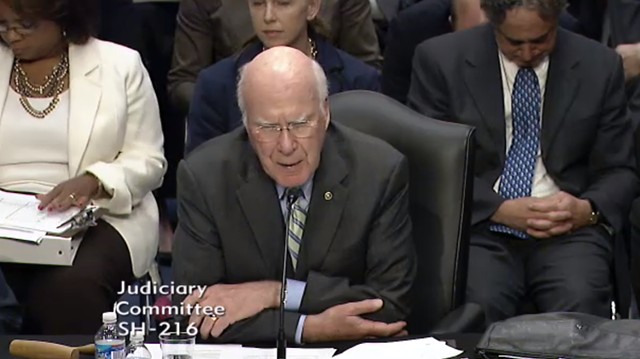click to enlarge 
As the Senate Judiciary Committee wrapped up its weeks-long debate over comprehensive immigration reform late Tuesday, Sen. Patrick Leahy (D-Vt.) did a rare and remarkable thing: He forced four Democrats who generally support gay rights to publicly acknowledge they would vote against a controversial gay rights measure.
In the backslapping world of the U.S. Senate, in which members of the same party typically look out for one another's political interests, that ain't how it usually works.
"It's courageous," former Massachusetts congressman Barney Frank tells Seven Days. "The hardest thing to do is to have to break with some of your friends."
The issue at hand, as we touched on briefly in this week's Fair Game, was a pair of amendments Leahy authored that would extend to gay Americans the right to request green cards for their foreign-born partners.
Leahy's been pushing the idea for a decade — first as a stand-alone bill called the "Uniting American Families Act." When its provisions weren't included in the comprehensive immigration bill drafted by the bipartisan "Gang of Eight," Leahy filed two amendments to the bill that would accomplish the same.
But the pushback from Senate Republicans was fierce — and even Democratic members of the Gang of Eight warned that if offered and accepted, Leahy's amendments could topple the delicate balance of immigration reform yet again. Those Democrats were so nervous Leahy would force a vote on the matter, they asked the White House to intervene — which it did Tuesday, according to the Associated Press.
"The real question was, 'Will Leahy buck the pressure and offer this?' Not even will he call for a vote, but will he offer it?" says Heather Cronk, co-director of the LGBT social justice group GetEqual, who attended Tuesday's mark-up.
Sure enough, after dispensing with nearly 300 other amendments to the immigration bill, the Judiciary Committee chairman called up one last amendment late Tuesday: his own.
"I don't want to be the senator who asks Americans to choose between the love of their life and the love of their country," Leahy said. "Discriminating against a segment of Americans because of who they love is a travesty and is ripping many American families apart."
Then, without indicating whether he would force a vote on it, the senator from Vermont said, "I know this issue is important to many who serve on this committee. Before I speak further, I'd like to hear from other members — especially from those who drafted this bill — who, for whatever reason, decided not to remove discrimination from our current immigration system in their legislative proposal."
Translation: If you're against this, speak up now and explain yourself. I won't let you quietly dodge the issue.
Four Democrats did.
"This is going to blow the [Gang of Eight] agreement apart," said Sen. Dianne Feinstein (D-Calif.). "I am for what Sen. Leahy is proposing. I would just implore him to hold up on this amendment at this time. You have support. I think we're going to get it done. I think we can get it done in a way that will not blow apart this bill."
Sen. Dick Durbin (D-Illinois), a cosponsor of the Uniting American Families Act, was the next Democrat at bat.
"I believe in my heart of hearts that what you're doing is the right and just thing — and I admire you for it very much, Mr. Chairman," Durbin told Leahy. "But I believe this is the wrong moment, that this is the wrong bill. There are approximately 250,000 LGBT undocumented immigrants in America that would benefit from the passage of immigration reform. I want to make certain they have that chance."
Joining Feinstein and Durbin was Sen. Chuck Schumer (D-N.Y.), a Gang of Eight member who has been heavily criticized by New York's gay community for advocating against Leahy's amendment. Calling it "one of the most excruciatingly difficult decisions" of his 35-year career, Schumer conceded that "not to do this is rank discrimination." Nevertheless, Schumer argued, he took seriously Republican threats to walk away from the bill if the amendment passed.
"They have said it publicly. They have told me privately. I believe it," Schumer said.
Last up was Sen. Al Franken (D-Minn.), who called the decision before him "the definition of a Hobson's choice."
"It's wrong to discriminate against people," Franken said. "But I do not want the LGBT people who would be hurt by this... whole bill not passing to be hurt by this bill falling apart."
Without those four votes, Leahy's amendment didn't stand a chance in a committee comprised of 10 Democrats and eight Republicans. So the chairman said that, "with a heavy heart," he would withdraw his amendment without a vote — and the committee would send the immigration bill to the Senate floor without protections for gay, bi-national couples.
"I will hope that senators eventually join with me to get this done at some point," he said.
So what to make of Leahy's move?
Was he standing up to a cowardly caucus of fellow Democrats willing to provide new rights to noncitizens, but unwilling to extend them to gays? Was he recklessly risking the implosion of the most important piece of legislation of President Obama's second term? Was he simply grandstanding — hoping to be hailed as a hero when it was clear all along his effort stood no chance?
Steve Ralls, a spokesman for the gay rights group Immigration Equality, says he doesn't think Tuesday's debate was elaborate political theater.
"I firmly believe that when Sen. Leahy brought this up in committee, that if even a few of his colleagues had his back there would have been a vote," Ralls says. "I think [Leahy] probably went into that room expecting that Schumer and Durbin would vote no. But when senators like Al Franken started throwing us under the bus, I have to imagine Sen. Leahy was as shocked as we were watching that."
Cronk, the GetEqual co-director, agrees. She credits the Vermonter for forcing "moral crisis" on his fellow Democrats and making them put up or shut up.
"I felt like he was really pushing for people to make the right decision," Cronk says. "It seemed he was really hoping his pushing, his badgering and his making folks go there would force them to make the right decision. In the end, it didn't. But he really did everything he could to get folks there."
Both Ralls and Cronk say there will be political consequences — for Leahy and for those who opposed his amendments.
"Sen. Leahy is going to have the support and admiration from the LGBT community on whatever he wants to do. Everyone who was in that room and who I've talked to since then was really genuinely moved by his remarks, and our community will not forget that," Ralls says. "On the flipside, we also aren't going to forget who threw us under the bus."
Noting that Schumer aspires to one day serve as Senate majority leader, Cronk says Leahy's move earned the New York senator some fierce enemies.
"Leahy put him in a really awkward position. The LGBT community is out for Schumer's head," Cronk says. "Leahy really stood up to him and said, 'Even if you're Senate majority leader one day and I really need you, this is worth debate.'"
But Frank, who spent 32 years in Congress and became its first openly gay member in 1987, says he sympathizes with both sides. He believes Leahy was right to introduce the amendment, but also right to withdraw it — and he finds little fault with Democrats who took a more pragmatic position.
"I know it was painful for Patrick, but I think he did the right thing," Frank says. "There was just no chance of the bill passing [if it included Leahy's amendment]. The immigration bill is a good bill. It's particularly important to the Hispanic community. I personally don't want to see gays be held responsible for this if it didn't pass."
In the end, Leahy's move may have accomplished nothing more than distinguishing between pragmatists and idealists. But in a body accustomed to stage-managed conflict and closed-door deals, perhaps finding out which senator was which was a service in and of itself.


















































